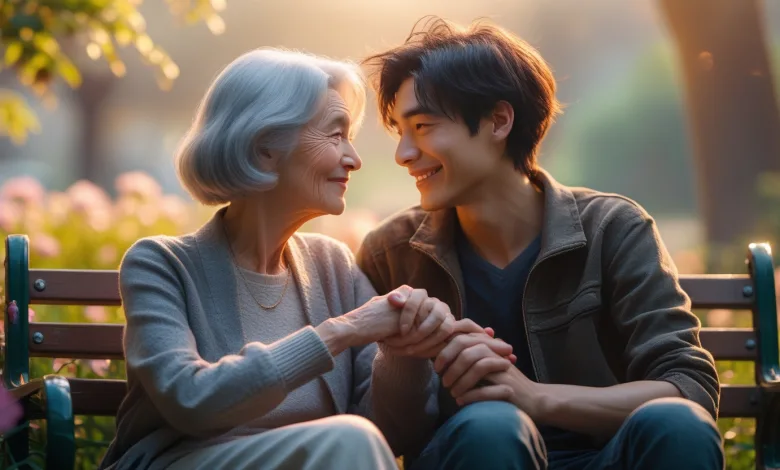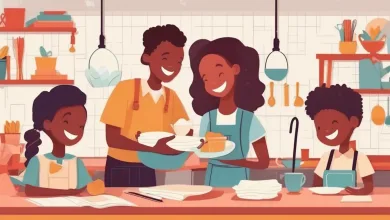Do Older Women Younger Men Relationships Ever Work?

They call it “cougar dating,” but that term barely scratches the surface of what happens when older women and younger men build meaningful connections. Let’s explore the fascinating psychology, real challenges, and surprising benefits of these relationships—and why they absolutely can thrive.
The Modern Landscape of Age-Gap Relationships
Boy oh boy, times have changed! Remember when eyebrows would raise dramatically at the mere mention of an older woman dating a younger man? Well, those days are fading faster than last season’s fashion trends. These relationships are becoming increasingly common and accepted in our society, and there’s a whole lot of psychology behind why they work so darn well.
The cultural shift is significant—what was once stigmatized is now celebrated. According to a study published in Psychology Today, relationships with age gaps where women are older have increased by nearly 40% in the last decade. And it’s not just a passing trend; these partnerships often have solid foundations that make them sustainable for the long haul.
The Psychology Behind the Attraction
Why are younger men drawn to older women? And what makes mature women find younger partners appealing? Trust me, it goes way deeper than stereotypes would have you believe!
What Younger Men See in Older Women
For starters, many younger men are attracted to the confidence and self-assurance that comes with age and experience. Older women typically know what they want, don’t play games, and communicate directly—qualities that can be incredibly refreshing in the dating world. As relationship psychologist Dr. Susan Winter explains, “Younger men are drawn to a woman’s competence and effectiveness. They find it emotionally and intellectually stimulating, and they’re typically not intimidated by female success.”
Additionally, there’s often an attraction to emotional stability. Many older women have worked through their insecurities and personal issues, creating a relationship environment that feels safe and nurturing. They’ve been around the block, so to speak, and that wisdom can be incredibly attractive.
What Older Women Find Appealing About Younger Men
Contrary to popular belief, it’s not about trying to recapture youth. For many older women, younger partners bring fresh perspectives, enthusiasm, and energy into their lives. There’s something invigorating about seeing the world through eyes that haven’t become jaded yet.
Research from the Journal of Couple & Relationship Therapy indicates that women in these relationships often report feeling more appreciated and valued. Many find that younger men are more willing to explore gender equality in relationships and share domestic responsibilities—a welcome change from traditional gender roles that may have defined their previous relationships.
Do These Relationships Actually Last? The Stats Say Yes!
Alright, let’s talk cold, hard facts. Do these relationships stand the test of time, or are they just exciting flings destined to fizzle out?
Research suggests they absolutely can last. A 2017 study from the Journal of Marriage and Family found that couples with age gaps of up to 10 years showed no higher divorce rates than same-age couples after controlling for other factors. Interestingly, the study noted that the success rate improved when the woman was the older partner compared to when the man was significantly older.
What’s more, relationship satisfaction in these pairings often scores higher in certain areas. The women report feeling more valued and heard, while the men appreciate the emotional intelligence and life wisdom their partners bring to the table. It’s a win-win situation when both partners value what the other brings to the relationship.
Common Challenges (And How Successful Couples Overcome Them)
No relationship is without its hurdles, and age-gap relationships come with their unique set of challenges. But here’s the kicker—knowing what these challenges are likely to be gives you a head start in addressing them!
Social Judgment and External Pressure
Even in our increasingly progressive society, couples with significant age differences sometimes face judgment or unwanted opinions from friends, family, and even strangers. This external pressure can be tough to navigate, especially in the early stages of a relationship.
Successful couples tackle this by:
- Establishing strong boundaries with others about comments or “concerns”
- Developing a united front and private jokes about the situation
- Choosing social circles that are supportive and open-minded
- Focusing on the relationship quality rather than external validation
As relationship expert David Bennett notes, “External judgment only has power if you give it power. The strongest age-gap relationships are those where both partners refuse to internalize societal criticism.”
Different Life Stages and Future Planning
When there’s a significant age gap, partners might be at different life stages—one might be focused on career building while the other is thinking about retirement. Or perhaps one partner wants children while the other has already raised theirs. These differences require honest conversations and creative solutions.
Psychotherapist Dr. Jenn Mann suggests, “The key is to not ignore the differences but to have explicit conversations about expectations, desires, and compromises. Couples who succeed plan their future based on mutual goals rather than age-typical timelines.”
The Unexpected Benefits Nobody Talks About
Now for the good stuff—the benefits of these relationships that don’t always make it into the mainstream conversation but often become the glue that holds these couples together.
Mutual Growth and Learning
There’s an incredible opportunity for growth when partners from different generations come together. The older partner can share wisdom and life experience, while the younger partner offers fresh perspectives and new ways of thinking. This exchange creates a dynamic learning environment within the relationship that keeps both partners intellectually stimulated.
Many couples report that this aspect of their relationship keeps things exciting long after the initial attraction might have worn off in a more age-matched relationship. It’s like having your very own personal growth consultant right there in your home!
Redefining Gender Roles and Expectations
Age-gap relationships where women are older often naturally challenge traditional gender roles. This can lead to more egalitarian partnerships where responsibilities are divided based on preference and ability rather than gender expectations.
Research from the University of Maine’s Center on Aging suggests that these relationships often feature more equitable divisions of household labor and financial responsibilities, which correlates with higher relationship satisfaction for both partners.
Real-Life Success Stories: When Age Is Just a Number
Let’s get inspired by some famous couples who’ve made it work despite significant age differences:
Emmanuel and Brigitte Macron have a 24-year age gap (she was his teacher!), yet they’ve built a strong partnership that has weathered intense public scrutiny. Brigitte has said, “The only problem is that he’s younger than me,” acknowledging that the age difference is just one aspect of their relationship, not its defining feature.
Nick Jonas and Priyanka Chopra have a 10-year age gap and have spoken openly about how their different perspectives strengthen their relationship. Priyanka has mentioned that Nick’s maturity level makes the age difference irrelevant in their day-to-day life.
These high-profile examples demonstrate that with mutual respect, communication, and genuine connection, age differences can become a background detail rather than a relationship-defining characteristic.
FAQs About Older Women-Younger Men Relationships
What’s the ideal age difference for a successful relationship?
There’s no magic number! Research suggests that relationships with age gaps of 10 years or less show similar success rates to same-age relationships. That said, it’s less about the number of years and more about compatibility in values, goals, and communication styles. Some couples with 20+ year age differences thrive, while some with smaller gaps struggle. It’s the individuals and their connection that matter most.
How do you handle family members who disapprove?
Setting boundaries is crucial. Make it clear that while you value their concern, your relationship decisions are your own. Sometimes, family members just need time to see the relationship in action before accepting it. Relationship counselor Dr. Terri Orbuch suggests, “Give them opportunities to see you together as a functioning, loving couple. People’s perceptions often change when they witness genuine happiness.”
What about children? Can these relationships work if one partner wants kids and the other doesn’t or can’t?
This requires honest communication early in the relationship. For some couples, options like adoption, surrogacy, or blending families from previous relationships provide solutions. Others may decide that their relationship fulfills them enough without children. The important thing is that both partners feel heard and that neither sacrifices a core life goal without fully processing that decision.
How do you deal with different energy levels due to age?
Finding a middle ground is key. Activities that both partners enjoy at their respective energy levels become the focus, while still making space for individual pursuits. Many couples report that the energy difference actually helps both partners—the younger partner might learn to appreciate slowing down sometimes, while the older partner often feels energized by their younger counterpart’s vitality.
Wrapping It All Up: More Than Just Making It Work
So, do older women-younger men relationships ever work? The evidence strongly suggests they don’t just work—they can thrive! When built on mutual respect, clear communication, and genuine connection, these relationships often offer unique benefits that same-age partnerships might miss out on.
The success of these relationships doesn’t come from ignoring the age difference, but rather from embracing it as just one of many factors that make the relationship unique. The age gap becomes another layer of the relationship’s texture rather than its defining characteristic.
As society continues to evolve beyond rigid age expectations in dating, we’re likely to see even more of these relationships flourishing openly. After all, when it comes to matters of the heart, authenticity and connection matter far more than numbers on a birth certificate.






